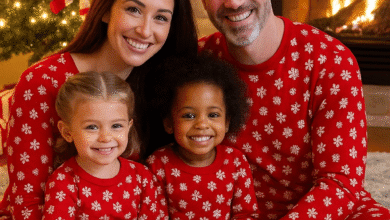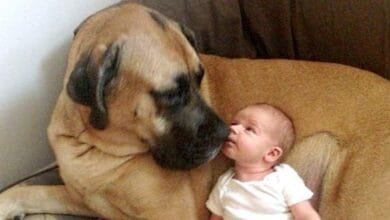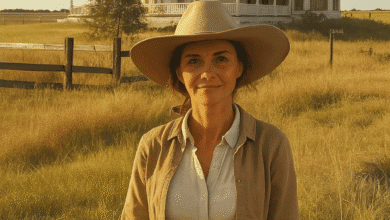MY AUTISTIC BROTHER NEVER SPOKE, BUT THEN HE DID SOMETHING THAT MADE ME CRY

I used to think I understood silence.
Growing up with Keane taught me to notice things others missed: a flicker in his eyes, a slight clench in his jaw, the way he lined up his pencils by color and size before doing homework. You either developed real patience—or got good at faking it. Pretending was how we survived our childhood.
Keane was diagnosed with autism when he was three. I was six.
I don’t remember the exact moment we got the news, but I remember how everything changed after that.
The house got quieter.
Mom became restless.
Dad snapped at everything—crinkling chip bags, cartoons playing too loud.
And I learned how to disappear, how to become small and quiet.
But Keane? He didn’t change.
He stayed gentle. Distant.
Sometimes he’d smile—usually at ceiling fans or drifting clouds.
He didn’t speak. Not then. Not ever.
Until one day, he did.
It was a Tuesday.
That meant diaper laundry, reheated pasta, and trying not to scream.
Owen, my baby, had just turned six months old and was going through a phase best described as “a tiny marshmallow possessed by chaos.”
My husband Will had been working double shifts at the hospital, and I was barely hanging on—surviving on lukewarm coffee and a mental checklist that never ended.
Keane, as usual, sat quietly in the corner of the living room, completely absorbed in his tablet, calmly matching colors and shapes.
He’d come to live with us six months earlier, right before Owen was born.
Our parents had passed away—dad from a stroke, mom from cancer—and after a rough experience in a state facility that made him withdraw even further, I couldn’t leave him there.
When I asked if he wanted to move in, he didn’t say anything. He just gave a tiny nod, eyes lowered.
And honestly, things worked out.
Keane never asked for anything. He ate what I cooked, folded his clothes like a soldier, and stayed lost in his digital world.
He didn’t talk—but he hummed. Softly. Constantly.
At first, it annoyed me.
Now, I barely noticed.
Until that Tuesday.
I had just managed to get Owen down for a nap after his third meltdown of the morning.
Maybe it was teething. Maybe gas. Maybe something paranormal.
I had no idea.
But I had ten golden minutes to myself, and I was going to take them.
I jumped into the shower like I’d escaped to a five-star resort. For a brief second, I pretended I wasn’t falling apart.
And then—I heard it.
That bloodcurdling baby scream. The “I’m dying!” kind of cry.
Panic hit before reason.
I ripped the shampoo from my hair, slipped on the floor tiles, and flew down the hallway.
But there was no chaos.
I froze.
Keane was sitting in my chair. My chair.
He had never sat there. Not once in six months.
But now he was, legs awkwardly tucked in, and Owen was curled up on his chest like he belonged there.
One hand gently stroked Owen’s back in slow, familiar motions—exactly how I do it.
The other arm cradled him just right. Secure but soft. Like instinct.
And Owen? Completely out. A bubble of drool on his lip. Not a single tear.
Our cat, Mango, was curled on Keane’s lap like she had signed a lease. She purred so loud I could feel it from the doorway.
I stood there, speechless.
Then Keane looked up. Not directly at me—more like through me—and whispered:
“He likes the hum.”
It hit me like a wave.
Not just the words.
The tone. The clarity. The presence.
My brother—who hadn’t spoken a full sentence in years—was here.
“He likes the hum,” he repeated.
“It’s like the app. The yellow one with the bees.”
I swallowed hard and stepped closer.
“You mean… the one with the lullaby?”
Keane nodded.
And that’s when everything began to change.
That day, I let him hold Owen a little longer.
I watched them breathe in sync.
I expected Keane to flinch like he usually did when I paid him attention—but he didn’t.
He stayed calm. Grounded. Real.
I asked him if he could feed Owen later. He nodded.
And again the next day.
A week later, I left them alone for 20 minutes.
Then 30.
Then two hours—while I grabbed coffee with a friend for the first time since giving birth.
When I got back, Keane had not only changed Owen’s diaper but also reorganized the entire changing table by color.
He also started speaking more. Little things.
Observations like:
“The red bottle is leaking.”
“Owen likes pears better than apples.”
“Mango hates it when the heater turns off.”
I cried more in those two weeks than I had the entire previous year.
Will noticed it too.
“It’s like a roommate just… woke up,” he said.
“It’s amazing.”
But it wasn’t just amazing.
It was terrifying.
Because the more Keane spoke, the more I realized I had never really seen him.
I had accepted his silence as all he had to offer—without ever asking if he wanted to offer more.
And now that he was offering—words, affection, presence—I felt guilt clawing at me like a second skin.
He had needed something I hadn’t seen.
And I had almost missed him again.
One night, I came back from Target and found Keane pacing—not rocking, pacing.
His footsteps were measured, steady—the way he walked when he was anxious.
Owen was crying in the nursery. Mango was scratching the door.
Keane looked at me, wide-eyed.
“I dropped him.”
My stomach sank.
“What?”
“In the crib,” he clarified. “I didn’t mean to wake him. I thought… but he hit the side. I’m sorry.”
I ran to Owen. He was fine. Barely crying. Just sleepy.
I picked him up, checked him. No bumps. No bruises.
Back in the living room, Keane was sitting with his hands clenched, whispering to himself:
“I messed up. I messed up.”
I sat next to him.
“You didn’t mess anything up.”
“But I hurt him.”
“No. You made a mistake. A normal one. A human one.”
He looked at me.
“You’re not broken, Keane. You never were. I just didn’t know how to listen to you.”
That’s when he cried.
Deep, quiet sobs.
I hugged him.
The way he hugged Owen.
Like someone who finally understands that love isn’t about fixing people—it’s about seeing them.
Now, six months later, Keane volunteers twice a week at a sensory play center.
He’s become Owen’s favorite person.
His first word was “Keen.”
Not “Mom.”
Not “Dad.”
Just “Keen.”
I never knew silence could be so powerful.
Or that a few whispered words could change everything.
But they did.
“He likes the hum.”
And I love how we found each other again.
As siblings. As family. As people who no longer expect to be understood—just seen.





